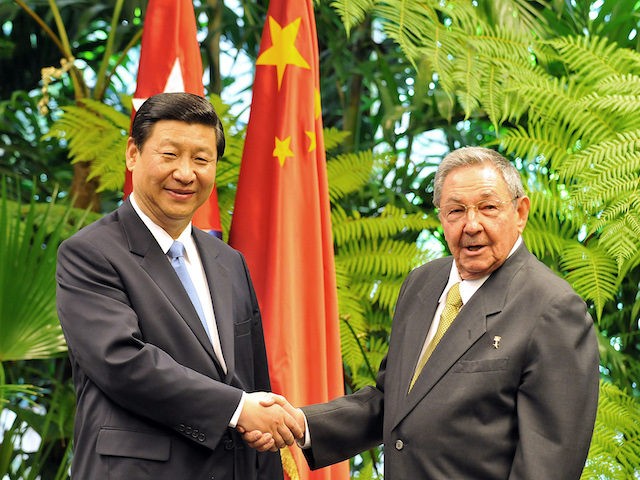The Chinese Foreign Ministry claimed on Tuesday that the United States was single-handedly responsible for all woes that Cuban people suffer under communism and asserted Beijing “stands ready to work with Cuba,” presumably to suppress the nationwide protests that began this weekend.
Cuba is a member of China’s Belt and Road Initiative (BRI), an infrastructure debt trap program run by the Communist Party of China, and is one of Beijing’s oldest allies. Both countries are members of the United Nations Human Rights Council and energetically defend themselves in that venue against the overwhelming evidence of human rights atrocities committed by their respective regimes.
Protests erupted in at least 20 municipalities throughout Cuba on Sunday calling for an end to the 62-year communist rule people have endured there. While Cuban dissident organizations have invested decades in organizing civil society to demand respect for their basic civil rights, plans to challenge the regime accelerated this year as groups organized conventions to plan a transition out of communism and focused attempting on recruiting pop stars and other artists to the cause. Chronic food shortages and a collapsed healthcare system, hallmarks of all communists regimes, exacerbated the need for protests during the Chinese coronavirus pandemic.
Chinese Foreign Ministry spokesman Zhao Lijian, the official responsible for the discredited conspiracy theory that the Chinese coronavirus originated in a U.S. Army laboratory, issued the first comment from the Chinese government on the ongoing protests in Cuba on Tuesday.
“China firmly opposes foreign interference in Cuba’s internal affairs, firmly supports what Cuba has done in fighting COVID-19 [Chinese coronavirus], improving people’s livelihood and upholding social stability,” Zhao said, “and firmly supports Cuba in exploring a development path suited to its national conditions.” Cuba has a notoriously poor track record in handling the coronavirus pandemic that includes inviting tourists from hotspots like Italy to visit the island at the height of the pandemic and refusing to shut down schools.
“I’d like to stress that China stands ready to work with Cuba to implement the important consensus of the two heads of state and is firmly committed to deepening friendly relations between the two countries,” Zhao added. He did not specify in what way China would be “ready to work” with Cuba, leaving open the possibility that Beijing would support Cuba’s repression of dissidents in the context of the protests this week. Cuban human rights groups believe hundreds of peaceful protesters are either in police custody illegally or have disappeared. Death tolls have not surfaced so far but dissidents have shared videos on social media showing police opening fire into crowds of unarmed protesters, leaving some on the ground, bloodied and appearing to suffer from gunshot wounds. Other images out of Cuba show police flagrantly beating unarmed protesters in broad daylight.
Zhao also took the opportunity to condemn the government of the United States, which has played no role in the protests.
“As the Cuban side pointed out, the US embargo is the root cause of Cuba’s shortage of medicines and energy,” Zhao falsely claimed. “The US should fully lift its embargo on Cuba and play a positive role in helping the Cuban people overcome the effects of the epidemic.”
The U.S. “embargo” does not prevent shipments of medicine or humanitarian supplies to Cuba. It has also done little to prevent tourism to the island, and it does not prevent Cuba from trading with over 190 countries around the world. The true embargo banning humanitarian aid from directly reaching Cubans in necessary quantities is a policy implemented by the Castro regime once American supplies arrive in Communist Party custody, where much of it disappears into the bureaucracy instead of the hands of its intended recipients.
China extended its support to Cuba on the anniversary of the 1994 massacre of 41 civilians on the March 13 tugboat, at the time attempting to flee the country by sea to the United States. Cuban officials flooded the vessel, carrying 72 people, using hoses in international waters. Several of the victims were toddlers; the youngest was a six-month-old girl.
China became Cuba’s largest trade partner in 2017 and began investing heavily in Cuban infrastructure after Miguel Díaz-Canel, appointed the face of the Castro regime in 2018, visited Beijing that year and signed onto the Belt and Road Initiative.
“As socialist countries, China and Cuba are good friends, comrades, and brothers,” Chinese dictator Xi Jinping said during his meeting with Díaz-Canel at the time. “Chinese people will never forget that Cuba, led by Comrade Fidel Castro, was the first nation in the western hemisphere to forge diplomatic ties with China 58 years ago.”
A year later, Cuba debuted a Chinese-built railway connecting Havana and Santiago de Cuba, the country’s two largest cities on opposite ends of the island. No evidence suggests Cuban citizens received jobs or benefits from the infrastructure project in any way, as Cuba bought the rail cars pre-made from China with a 15-year Chinese loan.
Like most BRI agreements, the provisions of the deal remain a secret.

COMMENTS
Please let us know if you're having issues with commenting.